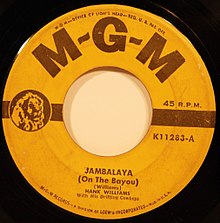Jambalaya (Hank Williams song)
Jambalaya (on the Bayou) [ ˌdʒæm.bə.ˈlaɪə ] ( ) is one of the most successful Cajun songs . It was popularized in 1952 by country music singer Hank Williams , whose version was number one on the country charts for weeks and also made it to the pop hit parade . The term jambalaya describes one of the most famous dishes in Cajun cuisine .
History of origin
The song is based on the French-language Cajun song Gran 'Texas by Fiddler Chuck Guillory & The Rhythm Boys from 1948. It was written in New Orleans in September 1948 with the line-up Chuck Murphy Guillory (fiddle), Jimmy C. Newman (rhythm guitar) , Julius "Papa" Cairo (vocals, steel guitar), Herman Durbin (piano), Pete Duhon or Howard Thiboudeaux (bass) and Curzy "Pork Chop" Roy (drums) recorded and released on Modern Records (# 612). The Hackberry Ramblers, founded in 1933, are registered as composers with BMI , namely James Glen Croker (piano), Luderin Darbone (fiddle), Edwin Duhon (accordion), John A Faulk (bass) and Benjamin F. Sandmel (drums).
The original text is about a lost love that leaves Louisiana for great Texas . The "big Texas" fulfills the role of the exotic elsewhere and was colloquial in Louisiana. Papa Cairo recorded the title in 1951 as Big Texas in an English and a French version on Feature Records (# 1049); this composition is registered for Jimmy C. Newman through Shelby Singleton Music Inc. All of these versions could not place in the charts and were only known in Louisiana.
Hank Williams
Country star Hank Williams had six top hits in the country charts and seven million-seller before he started Jambalaya / Window Shopping in Nashville in June 1952 . However, Hank Williams did not use the text of the original, rather he is said to have written the text interspersed with dishes from the Cajun cuisine and French words together with the unregistered Moon Mullican . His Drifting Cowboys Jerry Rivers (fiddle), Sammy Pruett (electric guitar), Eddie Hill (rhythm guitar), Don Helms (steel guitar), Ernie Newton and Cedric Rainwater (bass guitar) accompanied him during the recording, reinforced by music producers Fred Rose and Owen Bradley (piano).
Text excerpt: Jambalaya and a Crawfish Pie and Filé Gumbo . 'Cause tonight I'm gonna see ma cher ami-o. Pick guitar, fill fruit jar and be gay-o, son-of-a-gun we'll have big fun on the bayou .
Publication and Success
When the single was released in July 1952, it reached first place on the American country charts on September 6, 1952, where it remained for 14 weeks. Papa Cairo immediately claimed that Williams stole the song because the label identifies him as the sole composer. Supported by intensive airplay , Jambalaya developed into the eighth million seller for Hank Williams. The country hit also became an early crossover hit at number 20 on the pop charts, and made the Cajun piece known to a wider audience.
More cover versions
Three cover versions were created in quick succession. Pianist Mullican brought out the first cover (King # 5328), recorded in July 1952 on Radio Recorders in Hollywood and released in October 1952. His accompaniment included Jimmy Bryant (lead guitar), Billy Strange (guitar), Speedy West (steel guitar) and Roy Harte (drums). This was followed by a pop version by Jo Stafford (also recorded in July 1952), which rose to third place in the pop charts and also became a million seller. Producer Mitch Miller wanted to record the song with Jimmy Boyd first, but then decided on Stafford (Columbia # 39838). Rex Allen followed in August 1952 but missed the charts.
Brenda Lee recorded a rock 'n' roll version during her first recording session at the age of eleven (rather than nine as the label says) in July 1956 , which was released in September 1956 but missed the charts . In June 1957, Jimmy Dickens with the Country Boys (published November 1957) was again a country version. This was followed by Jerry Lee Lewis (recorded in March 1958; LP Jerry Lee Lewis ), then Paul Anka (ABC # 10078; December 1959). Gerd Böttcher's first single from July 1960 reached rank 34 in Germany with the German version, Gerhard Wendland had already sung the German text written by Kurt Feltz in 1953 as the B-side of The Red Bill by Golden Hill .
Only Fats Domino reached the charts again in November 1961 at number 30 in the pop hit parade; his version is based heavily on the complex arrangement of Professor Longhair , the version of which was published in 1960. Tony Sheridan with the Beat Brothers recorded another version in 1964. The Carpenters released a version in May 1973 that only appeared on the Now and Then LP in the US , while it was released as a single in Europe and ranked twelfth on the UK charts in March 1974.
Other artists who recorded the song included Emmylou Harris , Nitty Gritty Dirt Band , Sleepy LaBeef , Johnny Russell , John Fogerty , The Residents , Dolly Parton and Tommy Funderburk, whose version became known with the film Magnolias Made of Steel . The chorus of the song was also used for the Cologne carnival song of the robbers with the title Op dem Maat ("On the market"), which appeared in October 1993. According to BMI, there are a total of 47 cover versions in numerous languages; the piece was awarded a BMI Award .
Individual evidence
- ↑ tu m'as quitté pour t'en aller au Grand Texas . In Charles J. Stivale: Disenchanting Les Bons Temps: Identity and Authenticity in Cajun Music and Dance. 2003, p. 51.
- ↑ a b John Broven: South to Louisiana: The Music of the Cajun bayous. 1987. p. 34
- ^ Kai Sichtermann: Kultsongs & Evergreens. 2010. p. 181
- ^ Joseph Murrells: Million Selling Records. 1985, p. 76.
- ↑ Joel Whitburn's Pop Memories 1890-1954 , 1986, p. 407.



